Module 9 People and places>Unit 1 We’re enjoying the school trip a lot.
文档属性
| 名称 | Module 9 People and places>Unit 1 We’re enjoying the school trip a lot. | 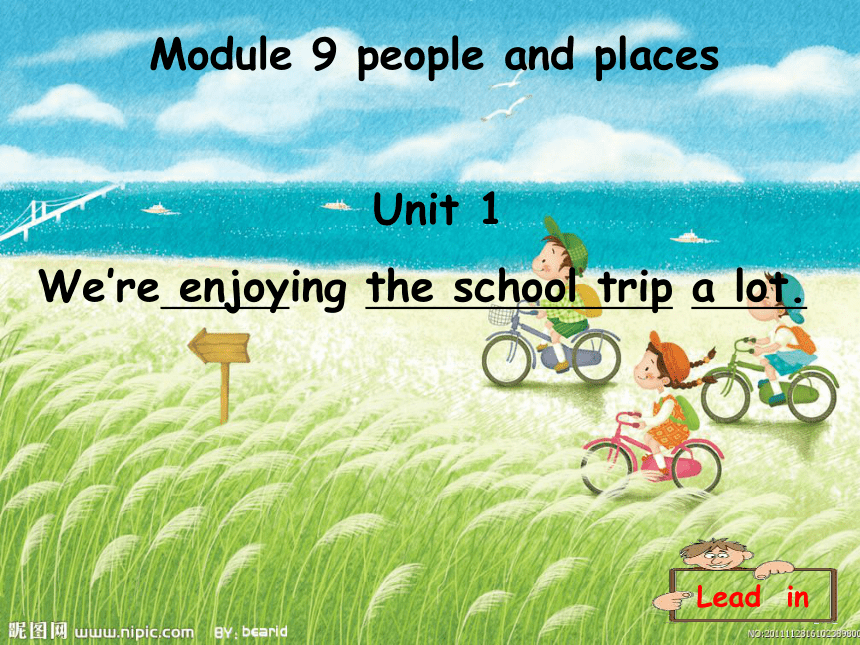 | |
| 格式 | zip | ||
| 文件大小 | 4.1MB | ||
| 资源类型 | 教案 | ||
| 版本资源 | 外研版 | ||
| 科目 | 英语 | ||
| 更新时间 | 2015-02-03 19:35:54 | ||
图片预览

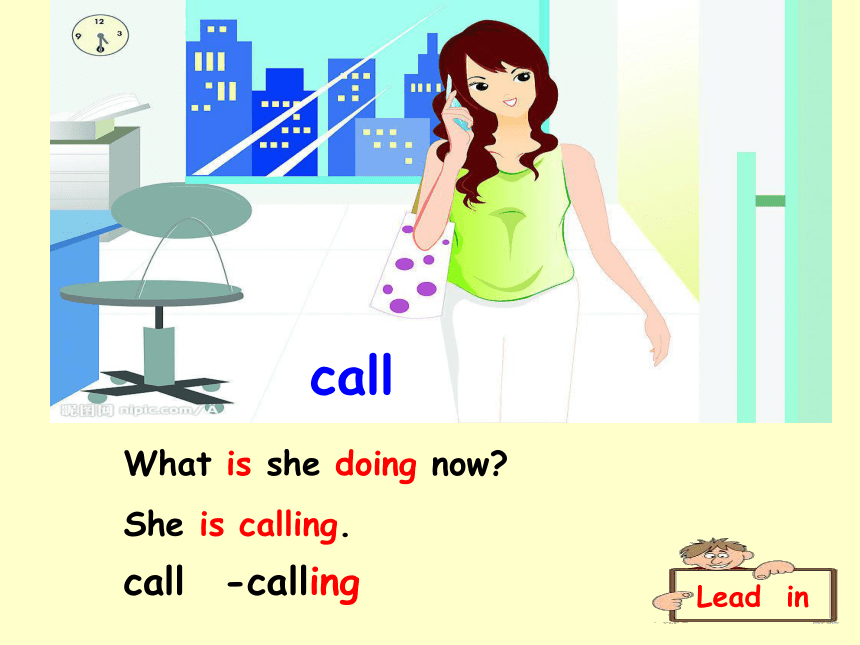
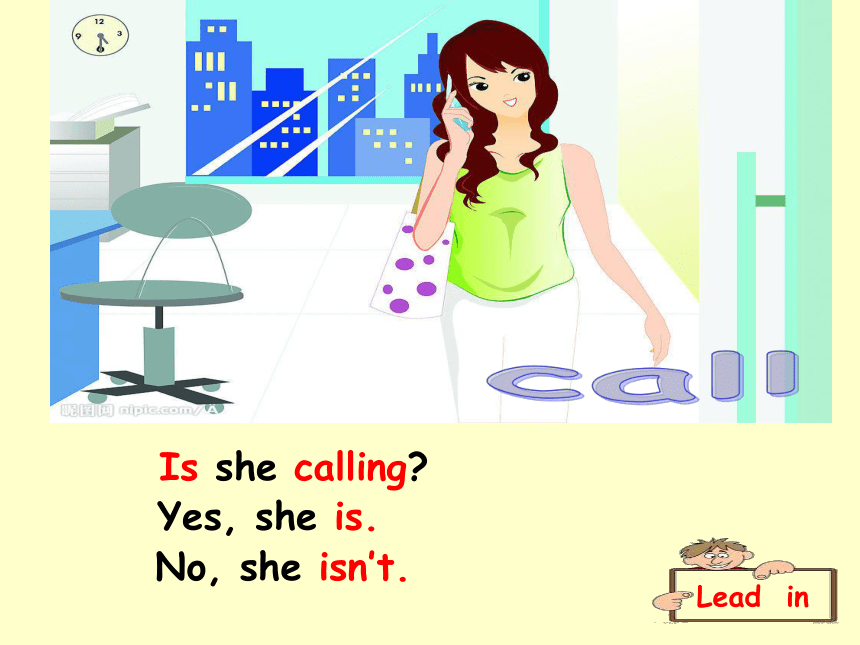


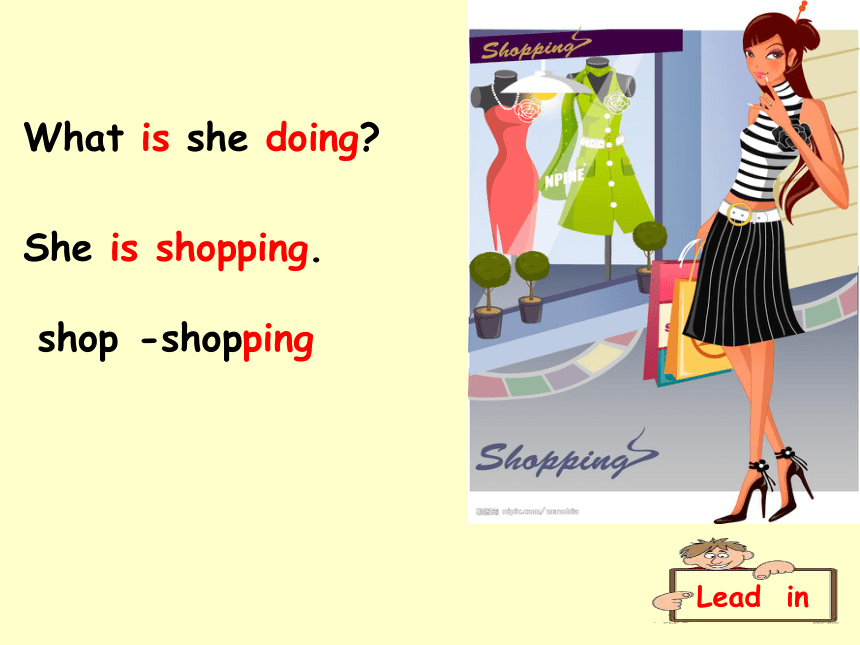
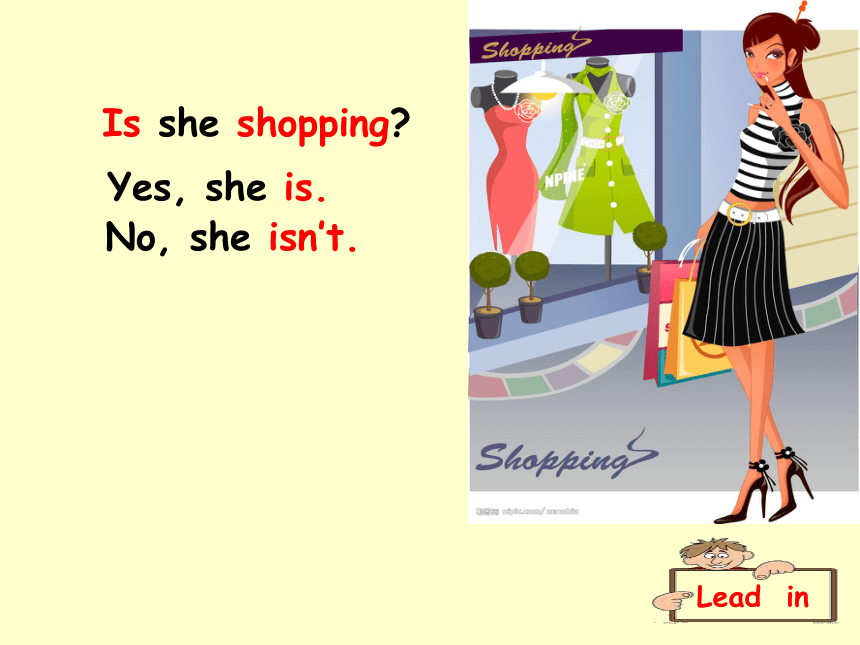
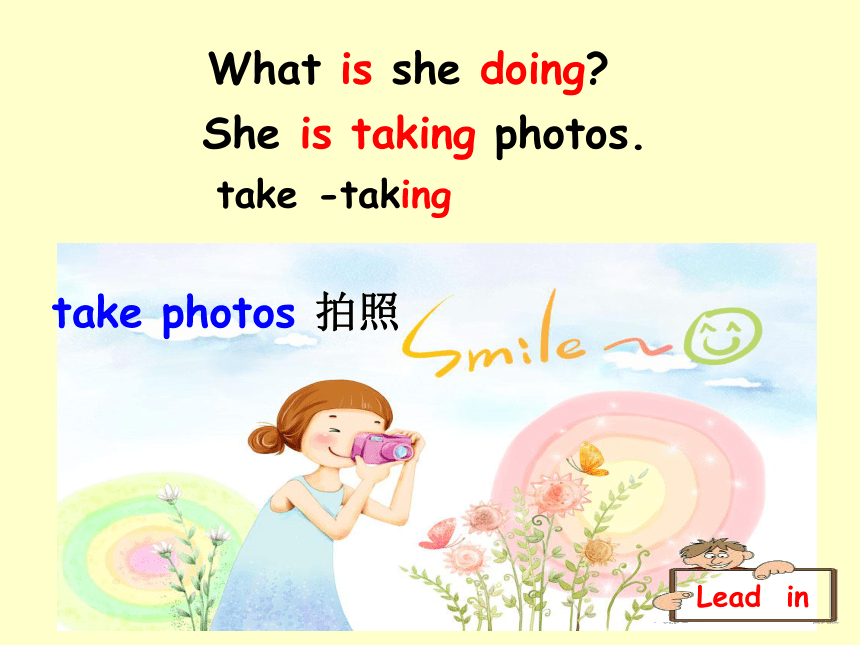
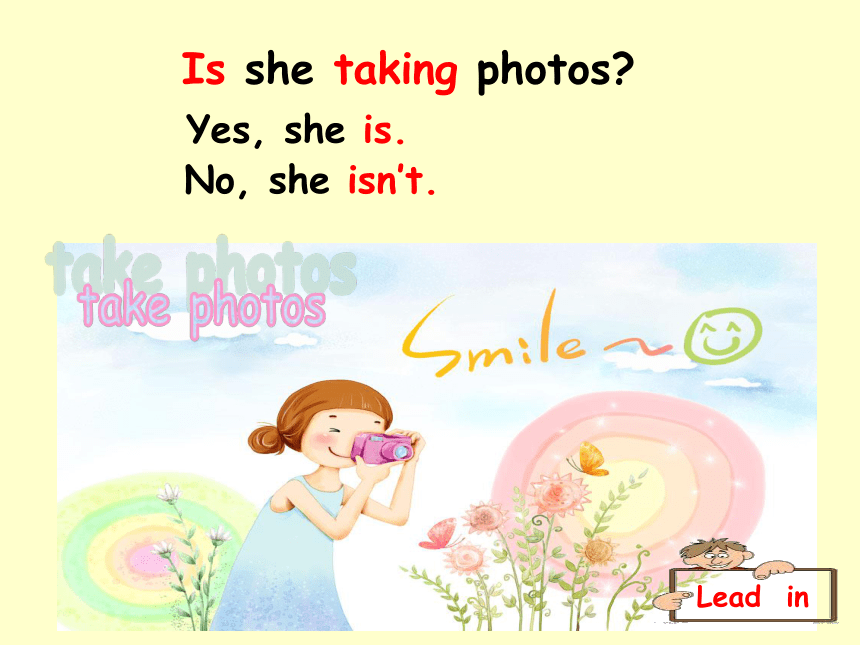
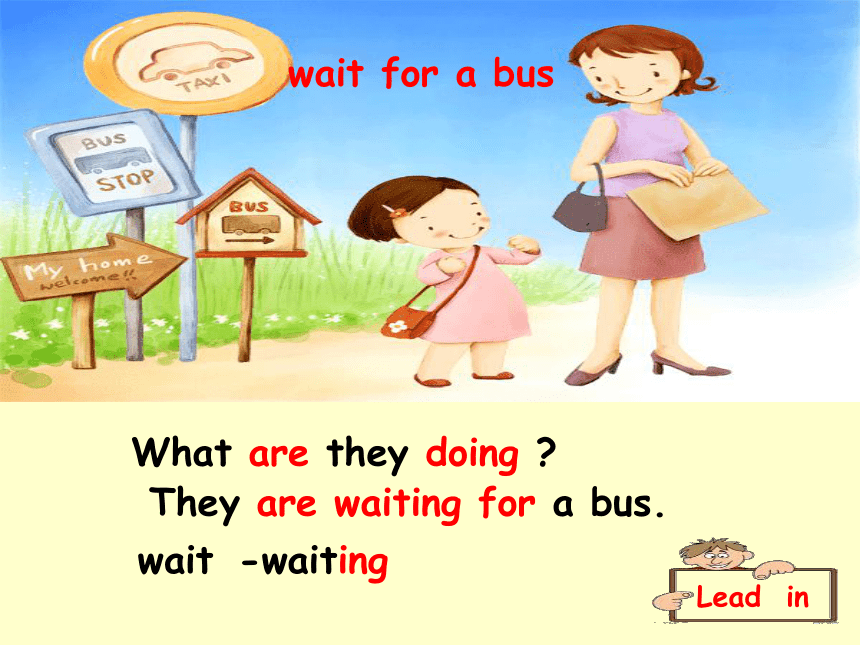
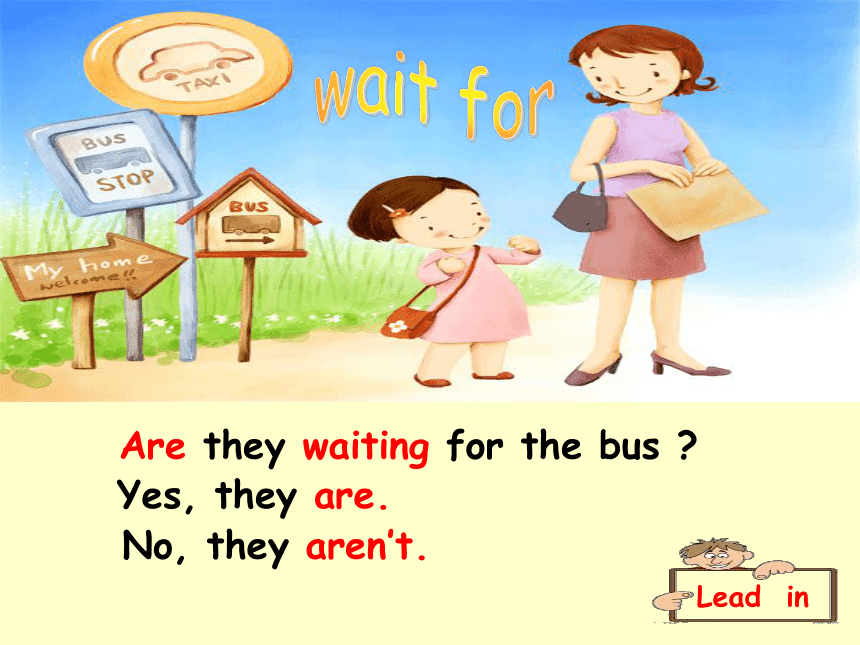
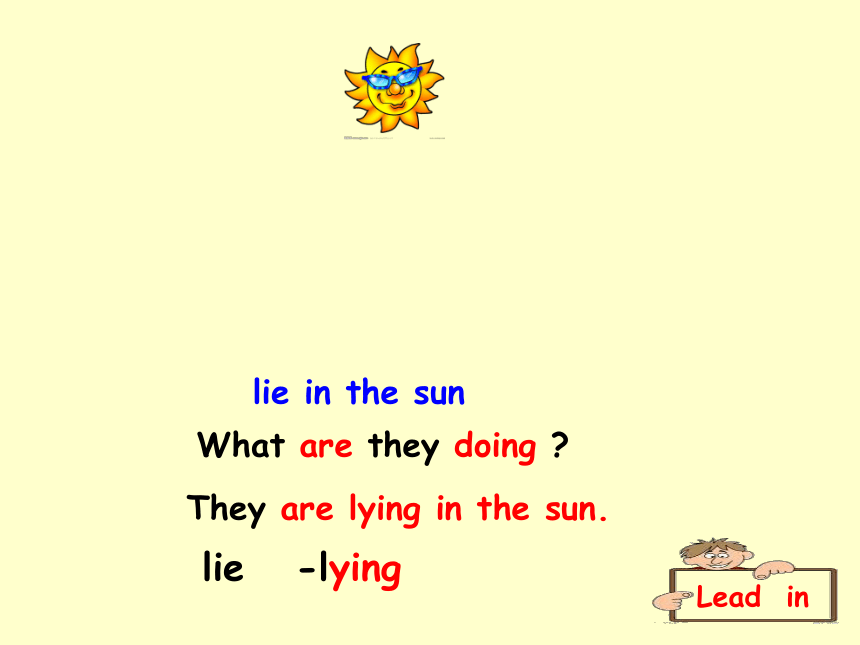
文档简介
课件50张PPT。 Module 9 people and places
Unit 1
We’re enjoying the school trip a lot.Lead inWhat is she doing now?
She is calling.Lead incall-callingcallIs she calling?callLead inYes, she is.No, she isn’t.What are they doing ?
They are standing in line.Lead instand-standingstand in line 排队Are they standing in line?stand in line Lead inYes, they are.No, they aren’t.What is she doing?
She is shopping.Lead inshop-shoppingIs she shopping?Lead inYes, she is.No, she isn’t.What is she doing?She is taking photos.Lead intake-takingtake photos 拍照Is she taking photos?take photosLead inYes, she is.No, she isn’t.What are they doing ?They are waiting for a bus.Lead inwait-waitingwait for a busAre they waiting for the bus ?Yes, they are.wait forLead inNo, they aren’t. What are they doing ?
They are lying in the sun.Lead inlie-lyinglie in the sun Are they lying in the sun?lie in the sunLead inYes, they are.No, they aren’t.buy postcards What are they doing ?
They are buying postcards.buy-buyingbuy postcardsAre they buying postcards ?Yes, they are.No, they aren’t.walk on the Great Wall What are they doing ?
They are walking on the Great Wall.walk-walkingwalk on the Great WallAre they walking on the Great Wall?Yes, they are.No, they aren’t.buy postcards 买贺卡
call 打电话
lie in the sun 躺在太阳下
shop 购物
stand in line 排队
take photos 拍照
wait for the bus 等公车
walk on the Great Wall 爬长城Pair work What is he/ she doing? She/He is+Ving
What are they doing? They are+Vingtake photos
taking shop
shopping wait for the bus
waiting lie in the sun
lying stand in line
standing eat an ice cream
eatingListen and number the pictures. ab c dListening 413 2现在进行时:表示正在进行的动作或状态。
构成:
be+动词的现在分词形式( -ing 形式)
e.g.I am talking with a boy.
我正在同一个男孩说话。
She is listening to me. 她正在听我说。
We are eating. 我们正在吃。Grammar动词的现在分词的变化规则
(动词-ing 的构成)
1)一般在词尾加ing,如:
read-reading look-looking
play-playing eat-eating
2)以不发音的e结尾,去e再加ing,如: take-taking have-having 3)以辅音字母结尾的重读闭音节,应双写尾字母,再加-ing,如:
sit-sitting run-running get-getting
swim-swimming shop-shopping
put-putting begin-beginning
4) 特殊 lie-lying现在进行时的各种句式:1、肯定句:
They are waiting for buses.
S. + be + V-ing + ……
2、否定句:
They are not (aren’t) waiting for buses.
S. + be + not + V-ing + ……3、一般疑问句:
Are they waiting for buses?
Yes, they are. /No, they aren’t.
Be+ S. +V-ing +…?
Yes, S. +be. / No, S. + be not
4、特殊疑问句:
特殊疑问词+一般疑问句句式?
What are they waiting for?
They are waiting for buses.1. enjoy________ wait_________
drink ________ buy ________
2. have ________ take________
write________ drive ________
3. run __________ swim __________
shop _________
4. lie ________
总结:现在分词的变化规律enjoyingwaitingdrinkingbuyinghavingtakingwritingdrivingrunningswimmingshoppinglying写出下列单词的现在分词形式Listen carefully and try to tell me:
(1) What is Betty doing?
(2) What is Tony / Wang Hui / Lingling /
Daming doing? She is calling her mother.He is eating an ice cream.He is taking lots of pictures.She is buying some presents and postcards.He is eating lunch and lying in the sun.Complete the tableShe’s standing on the Great Wall and talking to her mum.He’s eating a delicious ice cream.He’s taking a lot of photos.She’s buying a few presents and postcards.He’s having lunch and lying in the sun.A: What is … doing? B: She/He is…
A;Is he/she…? B: Yes, he/she is. No, he/she isn’t. Betty: Hi, Mum!
Mum: Hello, Betty. Where are you now?
Betty: I __________ on the Great
Wall of China and ______ to you.
Mum: Really? That’s great.
Betty: We’re __ a school trip.’m standingtalkingon Read and complete the dialogue.presentation Mum: What _____ the others?
Betty: Well, Tony _ ______ an ice
cream, Wang Hui _ ______
lots of photos and Lingling
_ ______ a few presents and
postcards. And Daming
_ ______ lunch and ____ in
the sun. aboutis eatingis takingis buyingis havinglyingpresentationLanguage points1. We’re enjoying the school trip a lot.我们非常喜欢学校的这次郊游。enjoy是动词,意为"喜欢,享受",其后可跟名词、代词或动词的-ing形式,其意义和用法均与love和like相近。如:
—Do you enjoy / like the movie? 你喜欢这部电影吗?
—Yes, I enjoy / like it a lot. 是的,非常喜欢。
He enjoys / loves traveling very much. 他非常喜欢旅游。【拓展】
enjoy还常用于短语enjoy oneself中,表示"过得愉快,感到快乐",相当于have a good time。如:
I enjoy myself here. 我在这儿过得很快乐。 be on a school trip: 进行/参加学校的郊游
trip n. 指短途“旅行;旅游”1. We’re on a school trip.我们在参加学校的郊游。Language point a good time意思是“美好时光”。例如:
This is a good time in her life. 这是她一生中的美好时光。
have a good / great / nice time意思是“玩得很高兴”。例如:
We all have a good time in the winter holiday. 我们寒假都过得非常愉快。2. We’re on a school trip and we’re having a good time. 我们在参加学校的郊游,玩得可高兴啦。3. And Daming is eating lunch and lying in the sun. 大明躺在阳光下吃午饭。当我们用lie表示“躺在某处”时,须根据具体情况而定其后面的介词。例如:
lie in the sun 躺在阳光下
lie on the bed 躺在床上
lie on the floor 躺在地板上
lie under a tree 躺在树下Language point 2. And Daming is eating lunch and lying in the sun. 当我们用lie表示“躺在某处”时,须根据具体情况而定其后面的介词。 大明在阳光下躺着吃午饭。lie in the sun 在阳光下躺着
lie on the floor 躺在地板上
lie under a tree 躺在树下3. We’re enjoying the school trip a lot. 我们非常喜欢学校的这次郊游。
a lot = very much 非常 (表程度)
与 a lot of 的区别:
a lot of 表示很多,后面跟名词(可数名词复数或不可数名词)
a lot 表示“很”,修饰动词,一般放在句末。4. It’s time to go back to school now. 到了回校的时间了。It’s time to do sth 到了做某事的时间了,也可以说It’s time for sth.
Eg.
It’s time to have lunch.
=It’s time for lunch.Underline the correct words.
The children are on a school (1) trip / holiday to the Great Wall. They’re walking on it, taking photos and buying (2) a few / a lot of presents, ice creams and postcards on (3) sale / line at the shop. They (4) are enjoying / aren’t enjoying the trip a lot.MaryLilyJim TomTony Alice MikeWork in pairsSummary 1. 站成一排 2. 等候公共汽车3. 爬长城4. 与某人交谈5. 买明信片6. 躺在阳光下7. 拍照8. 回学校
9. 通过电子邮件summary stand in line wait for the bus walk on the Great Wall talk to…… buy postcards lie in the sun take photos go back to school by email1. Li Lei ______ doing his homework.
A. am B. is C. are
2. Are you _______ photos ?
A. take B. taking C. takeing
3. Is Miss Gao ________ on the bed?
A. lie B. lies C. lying
4. Lingling and Daming _______ writing.
A. are B. am C. is
5. What are you ____?
A. do B. does C. doingBBCACChoose the right answer.6. There are ___animals in the zoo.
A. a lot B. a lot of C. lot of
7. Tony likes tigers ____.
A. a lot B. a lot of C. lots of
8. The two boys___on the playground.
A. run B. runs C. are running
9.---What are they____?—Some postcards.
A. shop B. shoping C. shopping for
10. Don’t read___the sun.It’s bad for your eyes.
A. in B. on C. underBACCA1.The students are___ a ____ ____(在学校郊游活动中).
2.They are_____ ___ _____ _____(正玩的很开心)
3.We are enjoying the school trip __ ___(非常,很)
4.We____ _______(正站在)on___ ______ _____(长城) and_____ ______(跟某人说话)you.
5._______(无论如何),we are going home.Complete these sentences.on school triphaving a good timea lotare standingtalking toAnyway the GreatWall6.Daming ___ ______(正吃) lunch and____ ____ _____ _____ (正躺在太阳下).
7.The girl _____ _______ ______(正在购买)a new hat.
8.There are___ ____(许多)teachers outside the building.is having lyingis shopping forlots ofin the sun达标练习A.单词拼写:
1. Can you c___(打电话)me tonight?
2. Betty is e_______(享受)herself at
her birthday party now.
3. Tony is l_____ (躺) in the sun and
eating an apple.
4. A_______, what time is it now?
5. The boy is t______ photos on the
Great Wall.allnjoyingyingnywayakingB. 完成下列句子:
1.大明在等谁?
Who ____ Daming ______________?
2.我们非常喜欢学校的这次郊游。
We _______________ the school trip
________.is waiting for are enjoying
a lot3. 看! 珍妮正躺在床上看书.
Look! Jenny _________in bed and
_________a book.
4. 他们在商店买一些特价明信片。
They _______________________ on
sale at the shop.are buying a few postcards is lying
readingRead the conversation carefully and match the people 1-7 with the actions a-g, and say what people are doing.1) Betty
2) Lingling
3) Daming
4) Tony
5) Lingling and Betty
6) Wang Hui
7) The children a He's lying in the sun.
b She's talking to her mother.
c They're enjoying the school trip.
d She's shopping for present.
e He's eating an ice cream.
f They're writing postcards.
g He's taking photos.Now listen again and check.Say what the people are doing in the pictures.
What are you doing? We are having English.
What is he/she doing?—He/She is sitting.
Is he/she opening the door? –Yes, he/she is.
/No, he/she isn’t. You aren’t playing football.am/is /are +v-ing…
Unit 1
We’re enjoying the school trip a lot.Lead inWhat is she doing now?
She is calling.Lead incall-callingcallIs she calling?callLead inYes, she is.No, she isn’t.What are they doing ?
They are standing in line.Lead instand-standingstand in line 排队Are they standing in line?stand in line Lead inYes, they are.No, they aren’t.What is she doing?
She is shopping.Lead inshop-shoppingIs she shopping?Lead inYes, she is.No, she isn’t.What is she doing?She is taking photos.Lead intake-takingtake photos 拍照Is she taking photos?take photosLead inYes, she is.No, she isn’t.What are they doing ?They are waiting for a bus.Lead inwait-waitingwait for a busAre they waiting for the bus ?Yes, they are.wait forLead inNo, they aren’t. What are they doing ?
They are lying in the sun.Lead inlie-lyinglie in the sun Are they lying in the sun?lie in the sunLead inYes, they are.No, they aren’t.buy postcards What are they doing ?
They are buying postcards.buy-buyingbuy postcardsAre they buying postcards ?Yes, they are.No, they aren’t.walk on the Great Wall What are they doing ?
They are walking on the Great Wall.walk-walkingwalk on the Great WallAre they walking on the Great Wall?Yes, they are.No, they aren’t.buy postcards 买贺卡
call 打电话
lie in the sun 躺在太阳下
shop 购物
stand in line 排队
take photos 拍照
wait for the bus 等公车
walk on the Great Wall 爬长城Pair work What is he/ she doing? She/He is+Ving
What are they doing? They are+Vingtake photos
taking shop
shopping wait for the bus
waiting lie in the sun
lying stand in line
standing eat an ice cream
eatingListen and number the pictures. ab c dListening 413 2现在进行时:表示正在进行的动作或状态。
构成:
be+动词的现在分词形式( -ing 形式)
e.g.I am talking with a boy.
我正在同一个男孩说话。
She is listening to me. 她正在听我说。
We are eating. 我们正在吃。Grammar动词的现在分词的变化规则
(动词-ing 的构成)
1)一般在词尾加ing,如:
read-reading look-looking
play-playing eat-eating
2)以不发音的e结尾,去e再加ing,如: take-taking have-having 3)以辅音字母结尾的重读闭音节,应双写尾字母,再加-ing,如:
sit-sitting run-running get-getting
swim-swimming shop-shopping
put-putting begin-beginning
4) 特殊 lie-lying现在进行时的各种句式:1、肯定句:
They are waiting for buses.
S. + be + V-ing + ……
2、否定句:
They are not (aren’t) waiting for buses.
S. + be + not + V-ing + ……3、一般疑问句:
Are they waiting for buses?
Yes, they are. /No, they aren’t.
Be+ S. +V-ing +…?
Yes, S. +be. / No, S. + be not
4、特殊疑问句:
特殊疑问词+一般疑问句句式?
What are they waiting for?
They are waiting for buses.1. enjoy________ wait_________
drink ________ buy ________
2. have ________ take________
write________ drive ________
3. run __________ swim __________
shop _________
4. lie ________
总结:现在分词的变化规律enjoyingwaitingdrinkingbuyinghavingtakingwritingdrivingrunningswimmingshoppinglying写出下列单词的现在分词形式Listen carefully and try to tell me:
(1) What is Betty doing?
(2) What is Tony / Wang Hui / Lingling /
Daming doing? She is calling her mother.He is eating an ice cream.He is taking lots of pictures.She is buying some presents and postcards.He is eating lunch and lying in the sun.Complete the tableShe’s standing on the Great Wall and talking to her mum.He’s eating a delicious ice cream.He’s taking a lot of photos.She’s buying a few presents and postcards.He’s having lunch and lying in the sun.A: What is … doing? B: She/He is…
A;Is he/she…? B: Yes, he/she is. No, he/she isn’t. Betty: Hi, Mum!
Mum: Hello, Betty. Where are you now?
Betty: I __________ on the Great
Wall of China and ______ to you.
Mum: Really? That’s great.
Betty: We’re __ a school trip.’m standingtalkingon Read and complete the dialogue.presentation Mum: What _____ the others?
Betty: Well, Tony _ ______ an ice
cream, Wang Hui _ ______
lots of photos and Lingling
_ ______ a few presents and
postcards. And Daming
_ ______ lunch and ____ in
the sun. aboutis eatingis takingis buyingis havinglyingpresentationLanguage points1. We’re enjoying the school trip a lot.我们非常喜欢学校的这次郊游。enjoy是动词,意为"喜欢,享受",其后可跟名词、代词或动词的-ing形式,其意义和用法均与love和like相近。如:
—Do you enjoy / like the movie? 你喜欢这部电影吗?
—Yes, I enjoy / like it a lot. 是的,非常喜欢。
He enjoys / loves traveling very much. 他非常喜欢旅游。【拓展】
enjoy还常用于短语enjoy oneself中,表示"过得愉快,感到快乐",相当于have a good time。如:
I enjoy myself here. 我在这儿过得很快乐。 be on a school trip: 进行/参加学校的郊游
trip n. 指短途“旅行;旅游”1. We’re on a school trip.我们在参加学校的郊游。Language point a good time意思是“美好时光”。例如:
This is a good time in her life. 这是她一生中的美好时光。
have a good / great / nice time意思是“玩得很高兴”。例如:
We all have a good time in the winter holiday. 我们寒假都过得非常愉快。2. We’re on a school trip and we’re having a good time. 我们在参加学校的郊游,玩得可高兴啦。3. And Daming is eating lunch and lying in the sun. 大明躺在阳光下吃午饭。当我们用lie表示“躺在某处”时,须根据具体情况而定其后面的介词。例如:
lie in the sun 躺在阳光下
lie on the bed 躺在床上
lie on the floor 躺在地板上
lie under a tree 躺在树下Language point 2. And Daming is eating lunch and lying in the sun. 当我们用lie表示“躺在某处”时,须根据具体情况而定其后面的介词。 大明在阳光下躺着吃午饭。lie in the sun 在阳光下躺着
lie on the floor 躺在地板上
lie under a tree 躺在树下3. We’re enjoying the school trip a lot. 我们非常喜欢学校的这次郊游。
a lot = very much 非常 (表程度)
与 a lot of 的区别:
a lot of 表示很多,后面跟名词(可数名词复数或不可数名词)
a lot 表示“很”,修饰动词,一般放在句末。4. It’s time to go back to school now. 到了回校的时间了。It’s time to do sth 到了做某事的时间了,也可以说It’s time for sth.
Eg.
It’s time to have lunch.
=It’s time for lunch.Underline the correct words.
The children are on a school (1) trip / holiday to the Great Wall. They’re walking on it, taking photos and buying (2) a few / a lot of presents, ice creams and postcards on (3) sale / line at the shop. They (4) are enjoying / aren’t enjoying the trip a lot.MaryLilyJim TomTony Alice MikeWork in pairsSummary 1. 站成一排 2. 等候公共汽车3. 爬长城4. 与某人交谈5. 买明信片6. 躺在阳光下7. 拍照8. 回学校
9. 通过电子邮件summary stand in line wait for the bus walk on the Great Wall talk to…… buy postcards lie in the sun take photos go back to school by email1. Li Lei ______ doing his homework.
A. am B. is C. are
2. Are you _______ photos ?
A. take B. taking C. takeing
3. Is Miss Gao ________ on the bed?
A. lie B. lies C. lying
4. Lingling and Daming _______ writing.
A. are B. am C. is
5. What are you ____?
A. do B. does C. doingBBCACChoose the right answer.6. There are ___animals in the zoo.
A. a lot B. a lot of C. lot of
7. Tony likes tigers ____.
A. a lot B. a lot of C. lots of
8. The two boys___on the playground.
A. run B. runs C. are running
9.---What are they____?—Some postcards.
A. shop B. shoping C. shopping for
10. Don’t read___the sun.It’s bad for your eyes.
A. in B. on C. underBACCA1.The students are___ a ____ ____(在学校郊游活动中).
2.They are_____ ___ _____ _____(正玩的很开心)
3.We are enjoying the school trip __ ___(非常,很)
4.We____ _______(正站在)on___ ______ _____(长城) and_____ ______(跟某人说话)you.
5._______(无论如何),we are going home.Complete these sentences.on school triphaving a good timea lotare standingtalking toAnyway the GreatWall6.Daming ___ ______(正吃) lunch and____ ____ _____ _____ (正躺在太阳下).
7.The girl _____ _______ ______(正在购买)a new hat.
8.There are___ ____(许多)teachers outside the building.is having lyingis shopping forlots ofin the sun达标练习A.单词拼写:
1. Can you c___(打电话)me tonight?
2. Betty is e_______(享受)herself at
her birthday party now.
3. Tony is l_____ (躺) in the sun and
eating an apple.
4. A_______, what time is it now?
5. The boy is t______ photos on the
Great Wall.allnjoyingyingnywayakingB. 完成下列句子:
1.大明在等谁?
Who ____ Daming ______________?
2.我们非常喜欢学校的这次郊游。
We _______________ the school trip
________.is waiting for are enjoying
a lot3. 看! 珍妮正躺在床上看书.
Look! Jenny _________in bed and
_________a book.
4. 他们在商店买一些特价明信片。
They _______________________ on
sale at the shop.are buying a few postcards is lying
readingRead the conversation carefully and match the people 1-7 with the actions a-g, and say what people are doing.1) Betty
2) Lingling
3) Daming
4) Tony
5) Lingling and Betty
6) Wang Hui
7) The children a He's lying in the sun.
b She's talking to her mother.
c They're enjoying the school trip.
d She's shopping for present.
e He's eating an ice cream.
f They're writing postcards.
g He's taking photos.Now listen again and check.Say what the people are doing in the pictures.
What are you doing? We are having English.
What is he/she doing?—He/She is sitting.
Is he/she opening the door? –Yes, he/she is.
/No, he/she isn’t. You aren’t playing football.am/is /are +v-ing…
同课章节目录
- Starte
- Module 1 My teacher and my friends
- Module 2 My English lesson
- Module 3 My English book
- Module 4 My everyday life
- Module 1 My classmates
- Unit 1 Nice to meet you.
- Unit 2 I'm Wang Lingling and I'm thirteen years ol
- Unit 3 Language in use.
- Module 2 My family
- Unit 1 Is this your mum?
- Unit 2 These are my parents.
- Unit 3 Language in use.
- Module 3 My school
- Unit 1 There are thirty students in my class.
- Unit 2 The library is on the left of the playgroun
- Unit 3 Language in use.
- Module 4 Healthy food
- Unit 1 We've got lots of apples.
- Unit 2 Is your food and drink healthy?
- Unit 3 Language in use.
- Module 5 My school day
- Unit 1 I love history.
- Unit 2 We start work at nine o'clock.
- Unit 3 Language in use.
- Revision module A
- Module 6 A trip to the zoo
- Unit 1 Does it eat meat?
- Unit 2 The tiger lives in Asia.
- Unit 3 Language in use.
- Module 7 Computers
- Unit 1 How do I write my homework on the computer?
- Unit 2 When do you use a computer?
- Unit 3 Language in use.
- Module 8 Choosing presents
- Unit 1 I always like birthday parties.
- Unit 2 She often goes to concerts.
- Unit 3 Language in use.
- Module 9 People and places
- Unit 1 We're enjoying the school trip a lot.
- Unit 2 They're waiting for buses or trains.
- Unit 3 Language in use.
- Module 10 Spring Festival
- Unit 1 Are you getting ready for Spring Festival?
- Unit 2 My mother's cleaning our houses and sweepin
- Unit 3 Language in use.
- Revision module B
